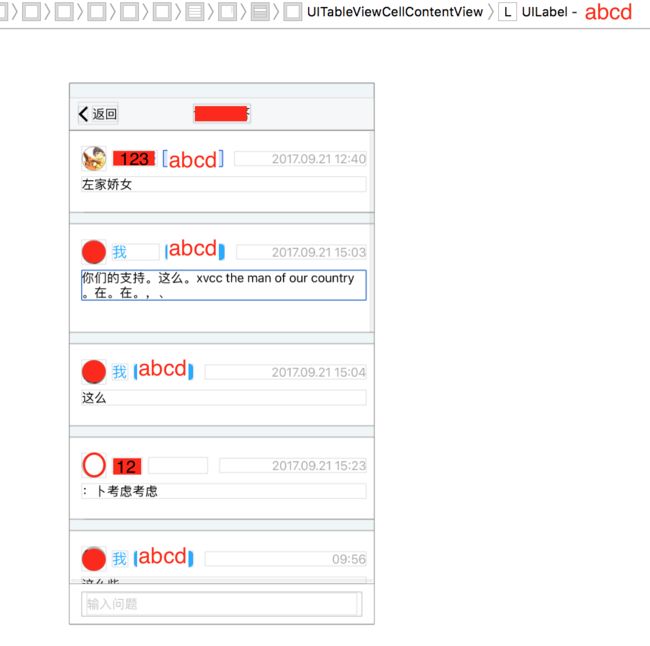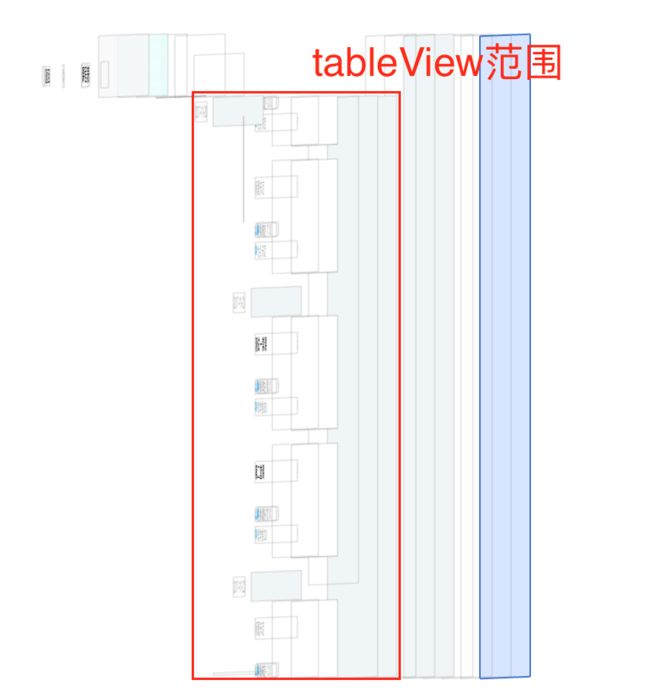Cell不变色、不可选
[A].Cell不变色
(a). Cell不能变色:
cell.selectionStyle = UITableViewCellSelectionStyleNone; //不能变色 (选中的风格:无颜色)
Cell的其他选中色:
//蓝色 cell.selectionStyle = UITableViewCellSelectionStyleBlue; //灰色 cell.selectionStyle = UITableViewCellSelectionStyleGray;
(b). Cell取消选中,变原色:
-(void)tableView:(UITableView *)tableView didSelectRowAtIndexPath:(NSIndexPath *)indexPath { //取消选中后,变为原色 [tableView deselectRowAtIndexPath:indexPath animated:NO]; }
[B].Cell不可选
a. 处理tableView的“select”方法:
- (NSIndexPath *)tableView:(UITableView *)tableView willSelectRowAtIndexPath:(NSIndexPath *)indexPath{ return nil; //tableview不可选 }
b. 不经过tableView的“select”方法
self.myTableView.allowsSelection = NO;//不响应select cell.selectionStyle = UITableViewCellSelectionStyleNone;//选中:无色
header标题
[ 1 ].系统自带的方法:
titleForHeaderInSection(背景色:深灰)// 深灰色(背景色) -(NSString *)tableView:(UITableView *)tableView titleForHeaderInSection:(NSInteger)section { ClassesListCellModel * model = self.dataArray[section]; return model.date; }
[ 2 ].自己把headerView视图,设置为一个Label
-(UIView *)tableView:(UITableView *)tableView viewForHeaderInSection:(NSInteger)section { UIView * view = [[UIView alloc] init]; UILabel * date_LB = [[UILabel alloc] init]; CategoryListCellModel * model = self.dataArray[section]; date_LB.text = model.date; //格式:@"2017-08-02" date_LB.textColor = [UIColor lightGrayColor]; [view addSubview: date_LB]; [date_LB mas_makeConstraints:^(MASConstraintMaker *make) { make.left.equalTo(view).with.offset(10.f); make.centerY.equalTo(view).with.offset(0.f); }]; view.backgroundColor = All_BG_Color; return view; }
内容重复:cell复用问题
QuesListTableViewCell * cell = [tableView dequeueReusableCellWithIdentifier:@"cell"];
if (!cell) {
cell = [[QuesListTableViewCell alloc] initWithStyle:UITableViewCellStyleDefault reuseIdentifier:@"cell"];
}
使用“Debug View Hierarchy”,查看视图关系:
解决
cell的复用,定位到每一行:[tableView cellForRowAtIndexPath:indexPath];
QuesListTableViewCell *cell = [tableView cellForRowAtIndexPath:indexPath];//定位到每一行
if (!cell) {
cell = [[QuesListTableViewCell alloc] initWithStyle:UITableViewCellStyleDefault reuseIdentifier:@"cell"];
}
改善后效果:
分割线隐藏:separator
设置separator背景色:透明
self.quesListTabV.separatorColor = [UIColor clearColor];
设置cell相对于contentView的上左下右间距
在“-(UITableViewCell *)tableView:(UITableView *)tableView cellForRowAtIndexPath:(NSIndexPath *)indexPath { }”里:cell.separatorInset = UIEdgeInsetsMake(0, cell.contentView.frame.size.width/2.f, cell.contentView.frame.size.width/2.f, 0);
提前 注册Cell (“register”方法)
-
- (void)registerClass:(Class)cellClass forCellReuseIdentifier:(NSString *)identifier NS_AVAILABLE_IOS(6_0);在创建UITableView的时候,就可以顺带注册复用的Cell!!
[self.tableView registerClass:[FKTableViewCell class] forCellReuseIdentifier:@"FKCell"];这样,在“
- (UITableViewCell *)tableView:(UITableView *)tableView cellForRowAtIndexPath:(NSIndexPath *)indexPath { }”里,就只需要:FKTableViewCell *cell = [tableView dequeueReusableCellWithIdentifier:@"FKCell" forIndexPath:indexPath];
可以省去如下代码:static NSString *CellIdentifier = @"FKCell"; FKTableViewCell *cell = [tableView dequeueReusableCellWithIdentifier: CellIdentifier]; if (cell == nil) { cell = [[FKTableViewCell alloc] initWithStyle:UITableViewCellStyleDefault reuseIdentifier:CellIdentifier]; //设置cell }
-
如果已经用NIB来制作了一个Cell:
- (void)registerNib:(UINib *)nib forCellReuseIdentifier:(NSString *)identifier NS_AVAILABLE_IOS(5_0);注册复用的cell!!
[self.resourceTabV registerNib:[UINib nibWithNibName:@"ResourceTableViewCell" bundle:nil] forCellReuseIdentifier:@"cell"];在“
- (UITableViewCell *)tableView:(UITableView *)tableView cellForRowAtIndexPath:(NSIndexPath *)indexPath { }”里:ResourceTableViewCell * cell = [tableView dequeueReusableCellWithIdentifier:@"cell" forIndexPath:indexPath];
可以省去如下代码:ResourceTableViewCell * cell = [tableView dequeueReusableCellWithIdentifier:@"cell"]; if (!cell) { cell = [ResourceTableViewCell xibTableViewCell]; }
在“ResourceTableViewCell.m”里面:
//实现类方法 +(instancetype)xibTableViewCell { //在类方法中加载xib文件 firstObject、lastObject都可以 return [[[NSBundle mainBundle] loadNibNamed:@"ResourceTableViewCell" owner:nil options:nil] lastObject]; }
Xib关联的UITableViewCell
视图布局(Xib文件)
在“JobsTableViewCell.m”里面: (loadNibNamed:加载nib)
//实现类方法
+(instancetype)xibTableViewCell {
//在类方法中加载xib文件 (仅一个元素 :firstObject、lastObject都可以)
return [[[NSBundle mainBundle] loadNibNamed:@"JobsTableViewCell" owner:nil options:nil] lastObject];
//loadNibNamed:关联的名字(本身名字)
}
- (void)awakeFromNib {
[super awakeFromNib];
/** 设置控件属性 */
self.titleImgV.image = [UIImage imageNamed:@"hg_job_avatar"];
self.titleLB.text = @"工作标题";
self.detailInfoLB.text = @"工作安排";
self.littlePicImgV.image = [UIImage imageNamed:@"hg_progress"];
}
使用Cell:
-
-
在“
-(UITableViewCell *)tableView:(UITableView *)tableView cellForRowAtIndexPath:(NSIndexPath *)indexPath { }”里:JobsTableViewCell * jobDataCell = [tableView dequeueReusableCellWithIdentifier:@"jobCell"]; //如果缓存池中没有,那么创建一个新的cell if (! jobDateCell) { //这里换成自己定义的cell,并调用类方法加载xib文件 jobDataCell = [JobsTableViewCell xibTableViewCell]; }
不能使用:“
alloc”方法创建Cell (❌❌❌❌❌❌❌)JobsTableViewCell * jobDataCell = [[JobsTableViewCell alloc] initWithStyle:UITableViewCellStyleDefault reuseIdentifier:@"jobCell"]; //❌❌❌ 不能使用 “alloc”方法 创建 ❌❌❌ -
-
-
另一种使用方式:(注册 复用的Cell)
在创建tableView时,直接注册 复用的Cell:[self.jobListTabV registerNib:[UINib nibWithNibName:@"JobsTableViewCell" bundle:nil] forCellReuseIdentifier:@"jobCell"];
在“-(UITableViewCell *)tableView:(UITableView *)tableView cellForRowAtIndexPath:(NSIndexPath *)indexPath { }”里的写法:JobsTableViewCell * jobDataCell = [tableView dequeueReusableCellWithIdentifier:@"jobCell" forIndexPath:indexPath];
-
自定义的Cell尺寸调整 (setFrame)
- (void)setFrame:(CGRect)frame {
//上 分隔线的距离:SCREEN_WIDTH*30.f/750.f
frame.origin.y += SCREEN_WIDTH*30.f/750.f;
//下 分隔线的距离:0 (= size.hight偏差 - origin.y偏差)
frame.size.height -= SCREEN_WIDTH*30.f/750.f;
float distance_X = SCREEN_WIDTH*30.f/750.f;//左、右边间距
frame.origin.x += distance_X;
frame.size.width -= 2*distance_X;
[super setFrame:frame];
}
效果:给layer层,加上边框!
添加 长按手势
// 添加长按手势
UILongPressGestureRecognizer * longPressGr = [[UILongPressGestureRecognizer alloc] initWithTarget:self action:@selector(longPressMyTableView:)];
longPressGr.minimumPressDuration = 1.5f; //长按手势的“最短时长”
[self.myTabV addGestureRecognizer:longPressGr];
//长按手势 的响应方法
-(void)longPressMyTableView:(UILongPressGestureRecognizer *)gesture {
if(gesture.state == UIGestureRecognizerStateBegan) { //“手势开始”状态
CGPoint point = [gesture locationInView: self.myTabV];
NSIndexPath * indexPath = [self.myTabV indexPathForRowAtPoint:point];
if(indexPath == nil) return; //其他 不是Cell所在的地方
NSLog(@"longPress indexPath.row:%ld",indexPath.row);//所点击cell的位置
//根据 所点击Cell的位置,做响应操作!
//add your code here
}
}
tableView相对于导航栏的偏移
宏定义:
//忽略导航栏
#define SCREEN_WithOutNavBar CGRectMake(0, 0, [UIScreen mainScreen].bounds.size.width, [UIScreen mainScreen].bounds.size.height - 64.f)
定义tableView:
self.detailsListTabV = [[UITableView alloc] initWithFrame:SCREEN_WithOutNavBar style:UITableViewStylePlain];
self.detailsListTabV.separatorColor = [UIColor clearColor];
[self.view addSubview:self.detailsListTabV];
故障的效果:
原因:
视图控制器会根据状态栏,导航栏和标签栏,来调整它所包含的scrollview的偏移量!!
由于tableview、collectionview和textview等都是继承于scrollview,所以都会出现这种情况。
解决:
self.edgesForExtendedLayout = UIRectEdgeNone;//从导航栏开始 //self.extendedLayoutIncludesOpaqueBars = NO;从导航栏开始,进行tableView的布局!!
效果:
Cell里的按钮响应
自定义的ResourceTableViewCell:
-
ResourceTableViewCell.xib:
-
“ResourceTableViewCell.h”里:
#import@protocol ClickCellDelegate //协议 各按钮点击响应 - (void)didClickIndexWithBtn:(UIButton *)button; @end @interface ResourceTableViewCell : UITableViewCell @property (nonatomic,weak) id delegate;//响应的协议 /** ⭐️⭐️⭐️直接拖的各个按钮⭐️⭐️⭐️ */ @property (weak, nonatomic) IBOutlet UIButton *collectionBtn;//收藏按钮 @property (weak, nonatomic) IBOutlet UIButton *sendToEmailBtn;//传到邮件按钮 @property (weak, nonatomic) IBOutlet UIButton *previewBtn;//预览按钮 +(instancetype)xibTableViewCell;//初始化方法 @end
-
“ResourceTableViewCell.m”里:
#import "ResourceTableViewCell.h" #define Button_Tag 1000 @implementation ResourceTableViewCell //实现类方法 +(instancetype)xibTableViewCell { //在类方法中加载xib文件 firstObject、lastObject都可以 return [[[NSBundle mainBundle] loadNibNamed:@"ResourceTableViewCell" owner:nil options:nil] lastObject]; } - (void)awakeFromNib { [super awakeFromNib]; _collectionBtn.tag = Button_Tag; //收藏按钮 _sendToEmailBtn.tag = Button_Tag + 1; //发送按钮 _previewBtn.tag = Button_Tag + 2; //阅览按钮 } /** ⭐️⭐️⭐️各按钮直接拖的方法⭐️⭐️⭐️ */ - (IBAction)collectBtnPress:(id)sender { [self tapWithBtn:sender]; } - (IBAction)sendToEmailBtnPress:(id)sender { [self tapWithBtn:sender]; } - (IBAction)perviewBtnPress:(id)sender { [self tapWithBtn:sender]; } -(void)tapWithBtn:(UIButton *)button { //声明好的代理 if([self.delegate respondsToSelector:@selector(didClickIndexWithBtn:)]) { [self.delegate didClickIndexWithBtn:button]; } } @end
使用
在使用了“ResourceTableViewCell”的tableView所在界面里:
满足协议:
设置全局变量:用来获取 做出响应的Cell 所在位置!!
NSIndexPath * _whole_IndexPath; //全局选择项
- 注册Cell:(在创建tableView时)
[self.reourcesTabV registerNib:[UINib nibWithNibName:@"ResourceTableViewCell" bundle:nil] forCellReuseIdentifier:@"cell"];
-
设置Cell的代理 (
在“
-(UITableViewCell *)tableView:(UITableView *)tableView cellForRowAtIndexPath:(NSIndexPath *)indexPath { }”里面:ResourceTableViewCell * cell = [tableView dequeueReusableCellWithIdentifier:@"cell" forIndexPath:indexPath]; cell.delegate = self;//设置代理
-
重写代理方法:
#pragma mark - ClickCellDelegate -(void)didClickIndexWithBtn:(UIButton *)button { ResourceTableViewCell *cell = (ResourceTableViewCell *)[[[button superview] superview] superview]; //cell、xib、view 三层 / ** 解释: 第1层:[button superview]是ResourceTableViewCell的“contentView”; 第2层:第二个superview是ResourceTableViewCell⭐️自己本身⭐️的“cell”; 第3层:第三个superview是⭐️UITableView⭐️的“cell”。 * / _whole_IndexPath = [self.reourcesTabV indexPathForCell:cell]; //⭐️⭐️⭐️获取到是哪一行的Cell 被点击!⭐️⭐️⭐️ //NSLog(@"indexPath row is = %li",(long)_whole_IndexPath.row); //获取该行Cell的模型 ResourceListCellModel * model = self.dataArray[_whole_IndexPath.row]; //获取该行Cell的模型 //⭐️⭐️⭐️用Cell按钮的tag值,来判断是哪个按钮⭐️⭐️⭐️ switch (button.tag - 1000) { case 0:{ //收藏 }break; case 1:{ //发送邮件 }break; case 2:{ //预览 }break; default: break; }
思路:
1.获取点击的Cell所在位置(indexPath);
2.根据tag值,判断是哪个按钮(子视图)被点击!
goyohol's essay






